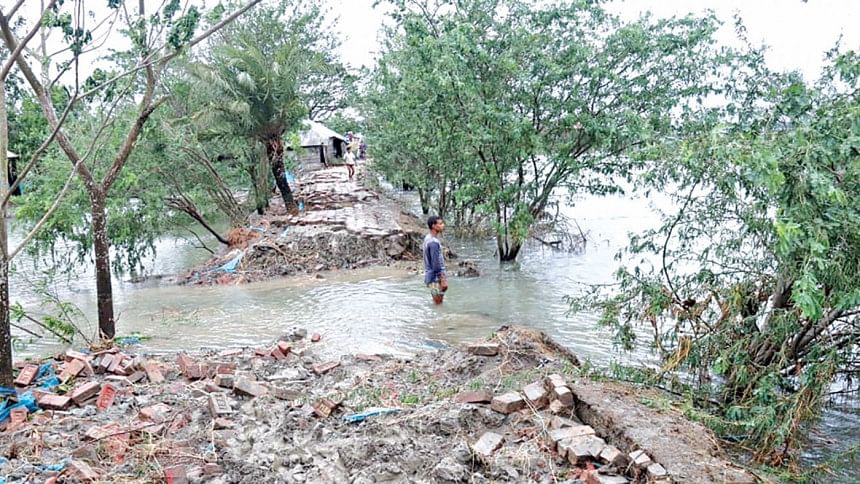Loss and damage from natural disasters made worse by climate change

As Bangladesh assumes the leadership of the Climate Vulnerable Forum (CVF) for the next two years, including at the next Conference of Parties (COP26) to be held in Glasgow, Scotland in November 2021, there is an opportunity for Bangladesh to push for the issue of loss and damage from climate change to be made a central topic for discussion at COP26. This is quite a politically sensitive issue that goes well beyond mitigation and adaptation, which have been the main focus of climate change conferences until now.
Loss and damage occur when the impacts of climate change cause permanent loss to human lives or animal species, and damage is caused to infrastructure such as roads and embankments. Thus, loss refers to things that cannot be brought back while damage refers to things that can be repaired. There are also economic losses, such as to agriculture and infrastructure, as well as non-economic losses to cultural heritage and human psychology.
The vulnerable developing countries have been arguing for loss and damage to be included in the annual global climate change conferences for many years and have achieved some limited success, such as the creation of the Warsaw International Mechanism on loss and damage at COP19 and also the inclusion of Article 8 of the Paris Agreement on Loss and Damage at COP21.
These achievements have enabled the issue to be further studied and discussed but the developed countries have refused to allow any discussions on financing loss and damage, beyond insurance.
Last year at COP25 in Madrid, Spain, the vulnerable developing countries pushed for both a new technical as well as funding wings for loss and damage. We managed to reach an agreement on the first, with the setting up of the Santiago Network on Loss and Damage, while we did not get anything on funding except to refer to the Green Climate Fund (GCF) .
At the same time, the actual impacts of human induced climate change are becoming visible around the world. The scientific community is now well able to credibly attribute climate change impacts to the elevated global atmospheric temperature, as a result of climate change caused by the emissions of greenhouse gases.
For example, the recent super cyclone Amphan that hit India and Bangladesh, landing on our coastal areas on May 20, was considerably more intense than normal cyclones due to the elevated sea surface temperatures of the Bay of Bengal, which made it a super cyclone rather than a more normal cyclone.
Although the loss of human life was minimised due to excellent warnings and millions of people being evacuated to cyclone shelters, there was considerable damage to crops and embankments as well as to flora and fauna in the Sundarbans, which bore the brunt of the impact.
This is thus attributable to loss and damage from human induced climate change and not just to a purely natural event. There are also many other such examples of climate events—such as floods, wildfires, droughts and heat waves—the enhanced intensity of which is now directly attributable to the fact that the global atmospheric temperature has been elevated by more than one degree centigrade due to emissions of greenhouse gases over the last century.
The impacts of the pandemic are also compounding the adverse impacts on the most vulnerable communities in every country, including the wealthy nations, and the path to recovery will require investment in both better public health as well as concentrated efforts to deal with loss and damage from climate change.
Another aspect that is closely related to loss and damage is the loss of livelihoods of people due to the adverse impacts of climate change, which forces them to have to migrate either within the same country or across international borders. Migration forced by climate change is now becoming a reality and is part of loss and damage, since it is a result of loss of livelihoods.
Prime Minister Sheikh Hasina of Bangladesh, on behalf of the CVF, has an opportunity to present evidence and make a strong scientific, as well as moral and political, case for funding loss and damage beyond insurance at COP26. Bangladesh needs to bring this issue up with the UK government, who will hold the presidency of COP26, to ensure that there is a satisfactory outcome on this topic in Glasgow next year.
The UK also needs to work with Bangladesh to try to ensure an outcome that is acceptable to vulnerable countries, when dealing with this highly politically sensitive issue. Failure to come to a satisfactory outcome will put the success of COP26 in jeopardy. This cannot be left to the last minute but must be worked on well before the countries arrive at COP26. This work needs to start immediately.
Saleemul Huq is Director of the International Centre for Climate Change and Development at the Independent University Bangladesh

 For all latest news, follow The Daily Star's Google News channel.
For all latest news, follow The Daily Star's Google News channel. 



Comments